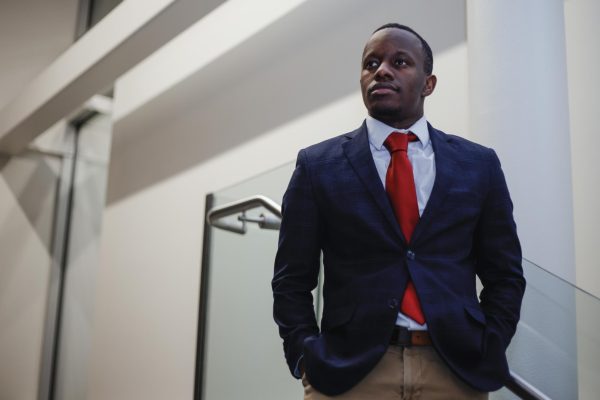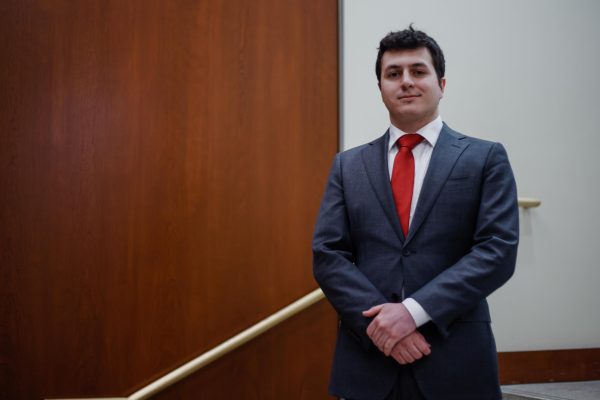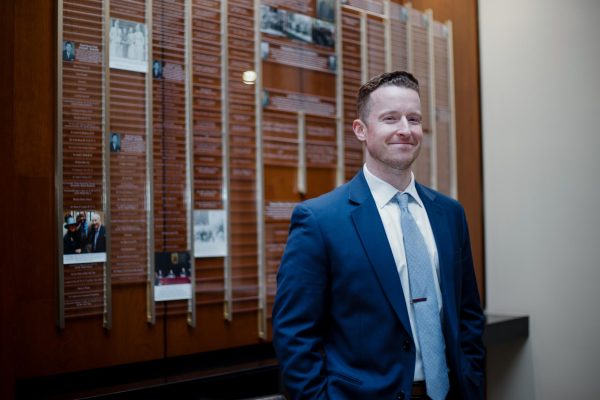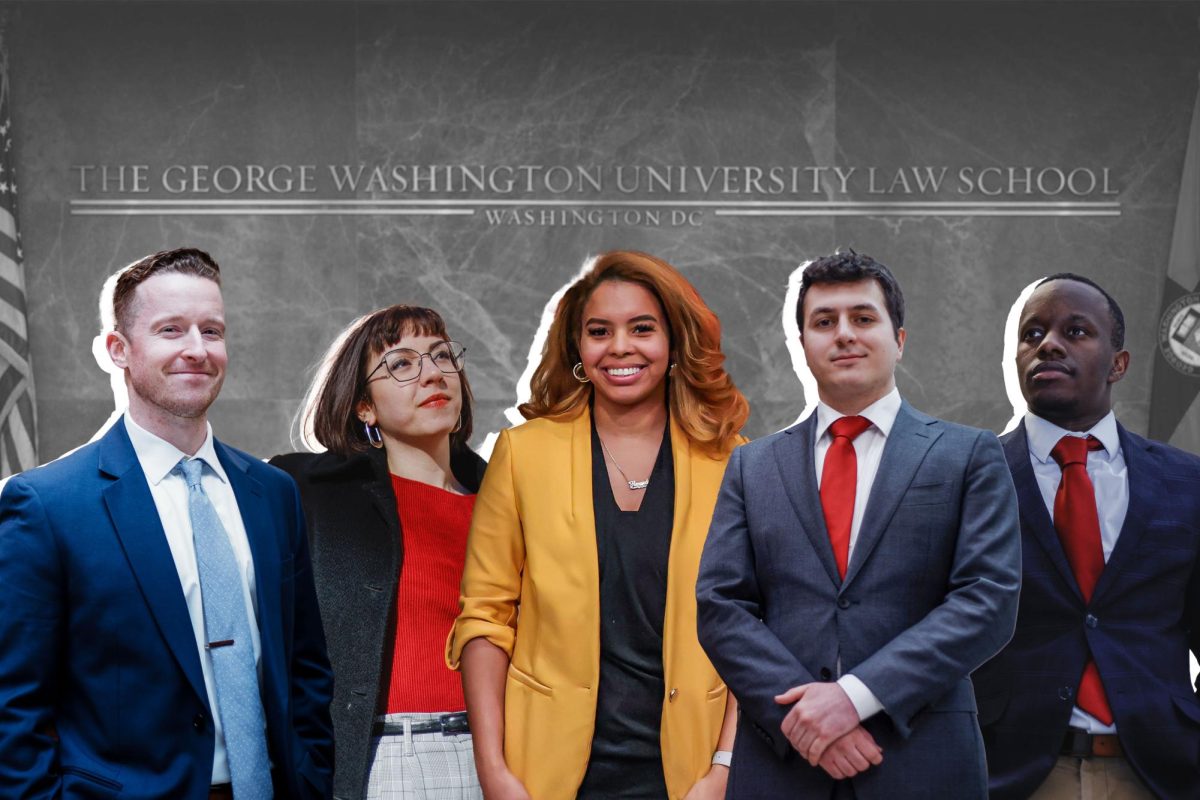As the Student Bar Association nears the end of a term defined by its leaders navigating budget constraints and mending relationships with GW Law officials, law students will elect the body’s next president and executive vice president Monday.
The five students running for the roles campaigned on boosting resources offered through the law school’s career center, strengthening ties with officials and preserving a balanced budget through SBA fundraising. All law students are eligible to vote in the election via a Google Form from 8 a.m. to 8 p.m. Monday.
This year, three presidential candidates and two executive vice presidential candidates are running to lead the SBA through its next term, which begins in April.
Candidates for SBA president:
SBA Executive Vice President Nigel Walton

Nigel Walton, a second-year law student from Georgia, said his experience serving in multiple roles on the SBA has prepared him to take on the role of president, particularly after he assumed the SBA executive vice president role for the 2024-25 term.
As a SBA senator last year, Walton advocated for continuing the body’s professional development fund, which finances students’ attendance of law conferences. This year, Walton said he was set to assume the role of legislative director until former SBA President Raisa Shah stepped down from the position, leading current SBA President Cherissa Lindsay to assume the role in her place and appoint Walton to executive vice president.
Walton said he will meet monthly with law school officials to improve the SBA’s relationship with administration after he said problems with a member of SBA this year contributed to a law school dean’s refusal to supplement the SBA budget if the body did not meet his funding requirements.
“We want a candidate who knows how to talk to the administration,” Walton said. “In the past, our communication with them has been — and I’ll just say it — it’s piss poor.”
Walton said his time on the SBA has taught him how the body’s senate operates. He said his term as vice president during the body’s budget shortage strengthened his ability to work well with senators.
Walton said he will work with the law school Career Development Office to bring an “individualized approach” to the career search by connecting students with alumni who can help them obtain jobs postgraduation.
Vice President of Finance Amanda Hichez:

Second-year law student Amanda Hichez said her thorough knowledge of the SBA finance system after a year of managing the body’s limited budget makes her the best candidate for president.
Hichez started as the SBA’s deputy vice president of finance last year, where she said she learned the ropes of the body’s budget and placed order requests for student organizations. Lindsay named Hichez the SBA’s vice president of finance at the start of the fall semester where she has overseen the SBA budget and worked closely with the law school Finance Office to process funding requests.
As SBA president, Hichez said she would look forward to helping her predecessor work through the difficulties of handling the SBA budget. She said this year, Lindsay was not as “hands on” in the budget process because she did not originally plan to take on the role of president and work closely with SBA finances.
This year was the first time the SBA operated without a surplus budget of funds leftover from unused funds during the COVID-19 pandemic, forcing the SBA to operate with a smaller budget than previous years.
Hichez said she plans to create a “comprehensive” budget guide for law school student groups, which will include organizations’ previous allocations and information about the annual SBA budget so they are not confused going into the allocations process.
“It was hard having to do it all by myself, and I’m just excited for next year because the person who takes on my job isn’t going to be as burdened,” Hichez said.
Hichez said she wants to increase the number of recurring events for law students, like Weekend Windup — an SBA-sponsored event for law students to socialize outside of a school environment — and other SBA social events the body cut this year due to the limited budget.
Hichez said she also wants to collaborate with the SBA faculty adviser to discuss expanding the Jacob Burns Law Library from its current weeknight closing time at 11:45 p.m. to a 24/7 operation.
Vice President of Student Affairs Jo Slaughter

As a public interest second-year law student, Jo Slaughter said her studies in the sector of labor laws, unions and advocacy for “those without a voice” will assist her in working with law school officials to put students first.
Slaughter said Shah appointed her before she stepped down from the presidency to serve as SBA vice president of student affairs, a role in which she registered new student organizations at the law school. She said her experience as a senator during her first year and in the SBA cabinet has given her ample “institutional knowledge” of the SBA and how to communicate with officials.
“You have to walk the line and have a friendly enough relationship with the dean of students to get them to work with you and be sympathetic to your cause, even when they may not agree,” Slaughter said.
Slaughter’s platform outlines her plans to increase the SBA’s transparency with students by including a budget update in the weekly SBA newsletter and requiring the vice president of finance to hold monthly office hours to address student budget concerns.
Slaughter also said she wants the SBA to “fundraise aggressively” through hosting more events and selling SBA merchandise to allot student organizations larger budgets to plan events throughout the semester. She said she would enact a fundraising requirement that aligns with the requirement for student organizations to host one fundraising event per year to become eligible for SBA funding the following year.
“Programming has demonstrated that they can spend less money and still hold successful events,” Slaughter said. “We should continue with that tighter budget while bringing in more money that can then kind of be a nest egg for student orgs.”
Candidates for executive vice president:
SBA Finance Chair Omer Turkomer

Omer Turkomer said his experience as the current chair of the SBA Finance Committee and Student Government Association senator helped him serve as a “mediator” on the body.
Turkomer, a second-year law student from Istanbul, Turkey, said he hopes to mend the relationship between the SBA vice president of finance and law school officials through increased communication about the state of SBA funds. He said last year’s SBA “mismanaged” funds, leading GW officials to lose trust in the body’s ability to handle funding this year.
“Playing the blame game isn’t going to help anybody,” Turkomer said. “So my idea is, let’s start fresh.”
He said there is a “separation” between the SBA and the student body because students are unaware of SBA Senate operations. He also said he wants the SBA to boost transparency by recording its meetings for students to watch if they are unable to attend the 8:50 p.m. biweekly senate meetings.
Turkomer, who is also an SGA senator representing the law school, said involvement with both bodies has exposed inefficiencies in some SBA practices, like the absence of “proxies,” a procedure used in the SGA where absent senators can select another senator to represent them during meetings.
This term, Turkomer sponsored an act that added financial security measures to the SBA — like restricting access to the SBA credit card to the vice president of finance — to avoid the executive branch overstepping their power. He said he wants the Dean of Students Office to attend the SBA Finance Committee and senate-at-large meetings to improve the clarity of the SBA budget process to administration.
SBA Sen. Quinn Biever

SBA Sen. Quinn Biever, a second-year law student from Bloomington, Illinois, said he has spent his first year in the SBA learning how it works and now wants to strengthen the body’s accountability.
Biever said he will work closely with the incoming SBA president to appoint a vice president of finance who will prioritize law student organizations in the funding process. Biever said ensuring identity-based organizations, like the Black Law Students Association and Lambda Law, receive funding is a top priority for him.
“Especially with sort of the political climate that we’re in, there are certain identity groups that it’s really important that students, law students and people that will someday be very important people in this world have a place,” Biever said.
He said he decided to run for executive vice president after noticing this year how communication between the SBA and the student body has “dropped off” and lacked open dialogue. He said the SBA needs to actively post on their website and table weekly. SBA bylaws require senators to table biweekly, but Biever said they did not carry out the requirement this year.
“We’re students just like you, we’ve been given the authority that comes with being a representative of student government and we want to make sure that that representation is in line with your desires as a student community,” Biever said.





